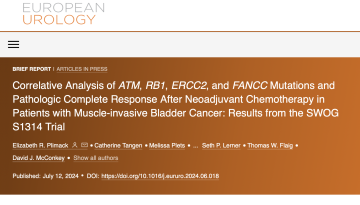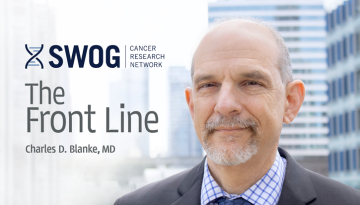Member Highlight: AnMed Health Cancer Center
The last SWOG member site highlighted in this space was the Southeast Clinical Oncology Research Consortium (SCOR) NCORP. I selected them because they were SWOG’s top overall NCORP accruer two years running!
Today, I want to call out the AnMed Health Cancer Center, in Anderson, South Carolina, not because they are a top overall accruer, but because they are a smaller site (one component site within the Upstate Carolina NCORP) that, through careful selection of a few SWOG trials, coupled with a whole lot of hard – and smart -- work, have managed to box above their weight in trial accrual. One of the studies they’ve chosen to focus their efforts on is our Lung-MAP master protocol, and they have long had a spot on the list of sites that are top accruers to that trial.
Though they are part of the larger AnMed Health system, they are a relatively small cancer center, with a staff of oncologists and oncologic surgeons numbering fewer than a dozen, and with a notably compact clinical trials research team under oncology research manager Rhonda Ballew, RN: only four research nurses, who recruit and consent all patients, follow them through treatment, and resolve all data queries – no dedicated clinical research associates or administrative assistants. They also don’t have regulatory staff of their own, but rely on the Upstate Carolina NCORP’s regulatory staff and institutional review board.
How do they achieve their outsized success with trials such as Lung-MAP? Here are a few of the carefully considered steps they highlight:
For starters, they’re highly selective in choosing which trials to open. They learn everything they can about a trial before deciding whether it’s a good fit for AnMed. Focusing intensively on a limited number of trials allows research staff to refine how they present each trial to patients, maximizes accrual, and helps ensure staff are collecting high-quality data.
AnMed’s research nurses do the initial eligibility screening (“down to the molecular level,” they say) of each patient’s record before clinic visits. They can then meet with the oncologist each morning to identify which of the day’s patients might be eligible. If the oncologist decides a patient is a good candidate, they introduce the trial as an option, and the research nurse follows up with a full presentation of the study.
For the Lung-MAP trial, the research team uses a dedicated spreadsheet to track CT scan schedules for patients whose non-small cell lung cancer is at an earlier stage than the stage 4 being studied in the trial. The list helps them quickly identify patients whose lung cancer has progressed to stage 4.
Also for Lung-MAP, the research team monitors biopsy results from patients who came in for low-dose CT screening for lung cancer. This gives them early notice of those who might at some point be candidates for enrollment to that trial.
Knowing that enrolling patients to clinical trials requires a group effort, they collaborate closely across disciplines and across support teams, consulting regularly with the center’s nurse navigators, for example, to identify trial candidates. Here, they make AnMed’s compactness an asset, finding value in having a “one-stop shop,” with doctors’ offices – both staff physicians and private practice – in the same building.
AnMed Health serves a highly diverse population, and the cancer center devotes significant effort to community outreach and to ensuring the patients they enroll to trials represent the full diversity of the population in their catchment area.
They regularly exceed their targets for representation in almost all demographic categories, but several years ago they were struggling to meet their targets for enrolling adolescent and young adult patients.
So, they pooled funds from several sources to support a position that would focus on both their AYA goals and their broader diversity goals. The research nurse they hired into that position has since had a significant impact. Their AYA enrollment to trials is up, and building on this track record of success, in 2021 they applied for and were awarded longer-term funding for this diversity champion position from the Upstate Carolina NCORP.
Part of the credit for their success in enrolling patients from historically underrepresented groups is AnMed Health’s year-long diversity leadership course, which the research team’s diversity champion has completed. Among other steps, the course takes leaders out into communities throughout the catchment area to learn first-hand about the lived experience of those they serve.
Connie Szczepanek, RN, BSN, chair of our oncology research professionals committee, has spoken about the importance to sites of “finding the studies that fit, and then going all in.” Seems to me AnMed Health Cancer Center is an outstanding example of such a site going all in, and SWOG is proud to count them as a member.
Other Recent Stories



